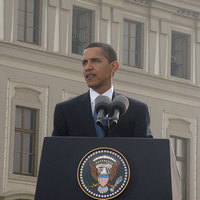New York and Washington may be separated by only a few hundred miles, but in the last few weeks, they have appeared to be light years apart on arms control and nonproliferation issues.
In New York, representatives of more than 100 countries worked from May 4-15 to prepare for next year's nuclear Nonproliferation Treaty review conference. Buoyed by U.S. President Barack Obama's April pledge to seek a world free from nuclear weapons, their work was marked by a spirit of cooperation and compromise that had been noticeably absent during the eight years of the Bush administration. They approved an agenda for next year's event in record time and contemplated forwarding an ambitious set of recommendations to the conference. They welcomed the reinvigoration of U.S-Russian strategic arms talks and Obama's commitment to again seek ratification of the Comprehensive Test Ban Treaty (CTBT) prohibiting nuclear weapon tests.
In Washington, the difference in tone could hardly have been more noticeable. With Israeli Prime Minister Benjamin Netanyahu's first meeting with Obama coinciding with another threatening Iranian missile test, the talk was of how long the United States or Israel would be willing to wait before launching a military attack against Iran. That came on the heels of North Korea dismissing international warnings and subsequent sanctions to conduct a major missile test, and just before Pyongyang's announcement yesterday of a second nuclear test, this time -- according to seismic analysis -- successful. Senior administration and military officials reiterated that Pakistan's survival was endangered by Islamic fundamentalists -- raising alarm bells about the security of its substantial nuclear arsenal. And a congressionally appointed commission split along partisan lines over whether Congress should take a second stab at approving the CTBT, initially defeated in the Senate in 1999, indicating that the administration will face an uphill battle in winning sufficient votes for Senate approval this time around as well.

